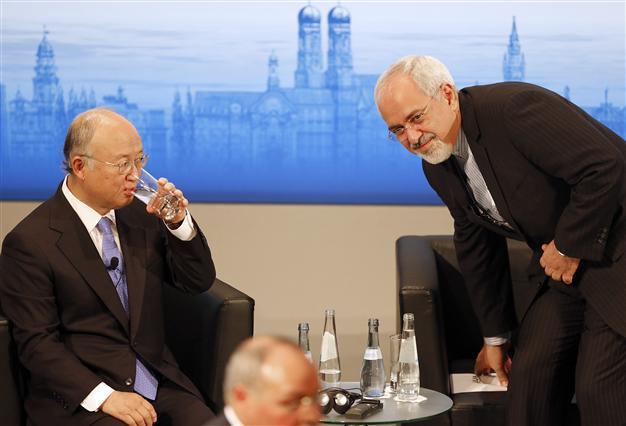No access to military site in UN nuclear deal: Iran
TEHRAN - Agence France-Presse

nternational Atomic Energy Agency (IAEA) Director General Yukiya Amano (L) and Iran's Foreign Minister Mohammad Javad Zarif attend the annual Munich Security Conference Feb 2. REUTERS photo
Iran agreed Feb. 9 seven more ‘practical steps’ with the U.N. nuclear watchdog in talks seeking further safeguards to enhance transparency on Tehran’s nuclear drive, a top official said. However, Tehran also added that it has not granted the U.N. atomic watchdog access to the Parchin military site, where the agency suspects experiments relating to nuclear weapons development may have occurred.
“Visiting Parchin is not included in the seven steps,” the spokesman for Iran’s atomic energy organization, Behrouz Kamalvandi, told the ISNA news agency, referring to elements of an agreement reached Feb. 9.
Seven more practical steps in regards to cooperation with the (International Atomic Energy) Agency was agreed” that need to be implemented by May 15, Iran’s envoy to the Vienna-based body, Reza Najafi said.
The remarks reported by Iranian media were attributed to a joint statement that came after two days of talks between five IAEA experts and Iranian nuclear officials led by Najafi.
No elements of the deal were publicized and Najafi reportedly said IAEA director general Yukiya Amano would brief the agency’s board of governors.
There was also no mention whether discussions had broached long-standing allegations that prior to 2003, and possibly since, Iran’s nuclear work had “possible military dimensions” as suspected by the IAEA.
Describing the talks however, Najafi said “constructive technical meetings” had assessed “the progress in implementation of practical steps” that was required of Iran under a framework deal agreed on November 11.
The deal required Tehran to take six practical steps that included visits to the unfinished site of a so-called heavy water research reactor in Arak and a uranium mine in the south.
Also required from Iran was information on future research reactors, identifying sites of new nuclear power plants, and clarification on Iranian statements regarding additional enrichment facilities and laser enrichment technology.
Western powers and Israel suspect that Iran’s nuclear drive masks military objectives, a claim Tehran repeatedly denies.
The November deal, struck after two years of on-off talks, was separate from a landmark agreement reached with world powers the same month that has placed temporary curbs on Iran’s nuclear activities.
